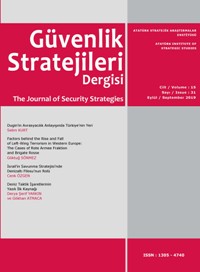Dugin’in Avrasyacılık Anlayışında Türkiye’nin Yeri
Turkey’s Position in Dugin’s Eurasianism Understanding
Author(s): Selim KurtSubject(s): Political history, Economic policy, International relations/trade, Post-War period (1950 - 1989), Cold-War History, Sociology of Politics, Geopolitics
Published by: Atatürk Stratejik Araştırmalar Enstitüsü
Keywords: Eurasianism; Neo-Eurasianism; Geopolitics; Russian Federation; Aleksandr Dugin;
Summary/Abstract: Eurasianism, which is a movement of idea that emerged in time of crisis in Russia, gained influence in the Russian political thought at the end of the 1980s, when the USSR began to give signs of collapse. This understanding, which is called as New Eurasianism, has started to be mentioned with Alexander Dugin, who has made his voice heard outside of Russia and who has ability to direct Russian political elite. Essentially, Dugin’s idea of Eurasianism is based on the competition between “land” and “sea” powers, which he borrowed from Mackinder. Dugin, who claims that this competition has came into existence in the rivalry between Russia and the USA today, has argued that the formation of a Eurasian Empire, where Russian Empire take place in its center, is vital to gain the upper hand in this struggle. Although Dugin pointed out that Turkey was an important threat to Eurasianism project in his book titled as “Russian Geopolitics”, which he wrote at the end of 1990s, he has begun to mention to include Turkey to Eurasianism as a partner in the following process. However, historical geopolitical competition between the two countries, which expressed repeatedly by Dugin himself, stands as an obstacle in front of this partnership.
Journal: Güvenlik Stratejileri Dergisi
- Issue Year: 15/2019
- Issue No: 31
- Page Range: 425-467
- Page Count: 43
- Language: Turkish

